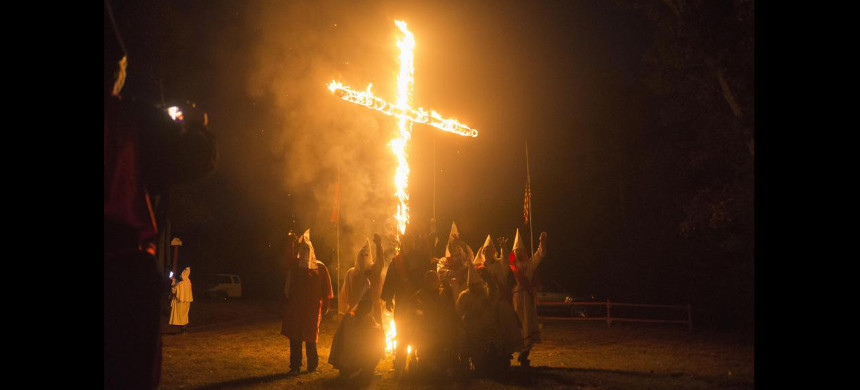Most Terrorists in the USA Are Right Wing, Not Muslim: Report
ANGLO AMERICA, 26 Jun 2017
22 Jun 2017 – U.S. President Donald Trump was elected vowing to get tough on “radical Islamic terrorism.” He has tried to implement a travel ban barring people from six Muslim-majority nations from entering the U.S. and has tweeted frequently about Islamist terrorist attacks around the world. On Thursday, a new report claimed the president has his facts muddled.
A joint project by the Investigative Fund at the Nation Institute, a nonprofit media center, and Reveal from the Center for Investigative Reporting has found that within the past nine years, right-wing extremists plotted or carried out nearly twice as many terrorist attacks as Islamist extremists. Of the 115 right-wing incidents, police only foiled 35 percent. Compare this to the 63 Islamist terrorism cases, where police foiled 76 percent of the planned attacks.

Members of the Rebel Brigade Knights and the Nordic Order Knights gather for a group photograph in front of a lit cross after a cross lighting ceremony at a private residence in Henry County, Virginia.
Photo: Johnny Milano/Reuters
Right-wing extremists were not only more successful, they were often more deadly, too. From 2008 to 2016, a third of right-wing attacks involved fatalities, compared to 13 percent of Islamist attacks. It should be noted, however, that Islamist extremists killed more people overall, with a death toll of 90 people compared to 79.
In a statement pointing out the higher rate of successful, right-wing terrorist attacks, the Investigative Fund said: “This project quantifies just how irrational Trump and the GOP’s fixation on ‘radical Islamic terrorism’ as the greatest security threat is.”
“Fixation” might be the right word. The president has yet to acknowledge the problem of right-wing violence, remaining uncharacteristically silent after an Islamophobic attack on a mosque in London that left one man dead. (Trump tweeted about the three incidents of Islamist terrorism that have hit the U.K. capital in recent months.)
Part of the problem, the Investigative Fund and Reveal suggest, are the people that Trump has advising him. Lt. Gen. Michael Flynn, the president’s former national security adviser, had said that “fear of Muslims is rational,” and that he doesn’t “see Islam as a religion.” Trump advisor Steve Bannon has referred to Islam as a “religion of submission,” and is believed to have been a strong advocate for the ban on certain nationalities entering the U.S. (As the former head of Breitbart News, Bannon boasted that the organization was “the platform for the alt-right.”)
The new administration, says Reveal and the Investigative Fund, is therefore unlikely to change the culture whereby federal authorities disproportionately focus on potential Islamist extremists. Of the incidents’ the two organizations registered, federal authorities handled 91 percent of the Islamist ones and just 60 percent of the right-wing ones.
DISCLAIMER: The statements, views and opinions expressed in pieces republished here are solely those of the authors and do not necessarily represent those of TMS. In accordance with title 17 U.S.C. section 107, this material is distributed without profit to those who have expressed a prior interest in receiving the included information for research and educational purposes. TMS has no affiliation whatsoever with the originator of this article nor is TMS endorsed or sponsored by the originator. “GO TO ORIGINAL” links are provided as a convenience to our readers and allow for verification of authenticity. However, as originating pages are often updated by their originating host sites, the versions posted may not match the versions our readers view when clicking the “GO TO ORIGINAL” links. This site contains copyrighted material the use of which has not always been specifically authorized by the copyright owner. We are making such material available in our efforts to advance understanding of environmental, political, human rights, economic, democracy, scientific, and social justice issues, etc. We believe this constitutes a ‘fair use’ of any such copyrighted material as provided for in section 107 of the US Copyright Law. In accordance with Title 17 U.S.C. Section 107, the material on this site is distributed without profit to those who have expressed a prior interest in receiving the included information for research and educational purposes. For more information go to: http://www.law.cornell.edu/uscode/17/107.shtml. If you wish to use copyrighted material from this site for purposes of your own that go beyond ‘fair use’, you must obtain permission from the copyright owner.